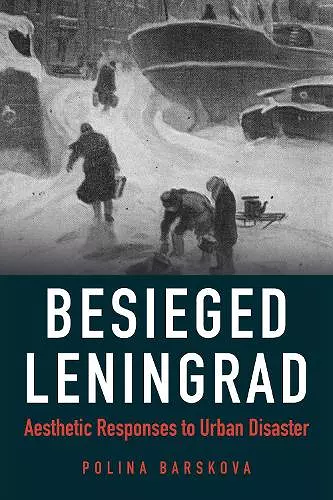Besieged Leningrad
Aesthetic Responses to Urban Disaster
Format:Paperback
Publisher:Cornell University Press
Published:15th Oct '17
Currently unavailable, and unfortunately no date known when it will be back

During the 872 days of the Siege of Leningrad (September 1941 to January 1944), the city's inhabitants were surrounded by the military forces of Nazi Germany. They suffered famine, cold, and darkness, and a million people lost their lives, making the siege one of the most destructive in history. Confinement in the besieged city was a traumatic experience. Unlike the victims of the Auschwitz concentration camp, for example, who were brought from afar and robbed of their cultural roots, the victims of the Siege of Leningrad were trapped in the city as it underwent a slow, horrific transformation. They lost everything except their physical location, which was layered with historical, cultural, and personal memory. In Besieged Leningrad, Polina Barskova examines how the city's inhabitants adjusted to their new urban reality, focusing on the emergence of new spatial perceptions that fostered the production of diverse textual and visual representations. The myriad texts that emerged during the siege were varied and exciting, engendered by sometimes sharply conflicting ideological urges and aesthetic sensibilities. In this first study of the cultural and literary representations of spatiality in besieged Leningrad, Barskova examines a wide range of authors with competing views of their difficult relationship with the city, filling a gap in Western knowledge of the culture of the siege. It will appeal to Russian studies specialists as well as those interested in war testimonies and the representation of trauma.
"Besieged Leningrad is a sophisticated, immensely rich exploration of what the author calls 'siege spatiality.' The core analytical chapters present fascinating treatments of aspects of the Leningrad Blockade, and the prose is lively, precise, and elegant."—Andreas Schönle, coeditor of The Europeanized Elite in Russia, 1762–1825 (NIU Press, 2016)
"This is a poignant story that documents how a war disaster in a major Russian city transformed and shaped perceptual qualities and skills of the city's inhabitants. Through a close reading of well-known texts, new and recently discovered documents, interviews, and collected visual materials, Barskova reconstructs 'practices of life' in a besieged city."—Serguei Alex. Oushakine, author of The Patriotism of Despair: Nation, War, and Loss in Russia
"a major work.No other source in English provides such a detailed account of the efforts of State Public Library staff to save private book collections. None does as good of a job establishing the importance of books and reading in the life of siege inhabitants, or offers as much insight into patterns of literary reference in Blockade fiction, poetry, and memoirs. None so sensitively explores one of the great paradoxes of descriptions of Blockade life. Besieged Leningrad is beautifully written, well-organized, and so readable that portions of it might reasonably be assigned to undergraduates. It will interest anyone who works on Petersburg and/or the literature of trauma and will make an excellent library purchase.
" –Slavic and East European Journal
ISBN: 9780875807720
Dimensions: 229mm x 152mm x 14mm
Weight: 454g
232 pages